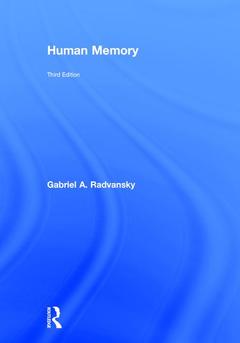Description
Human Memory (3rd Ed.)
Author: Radvansky Gabriel A.
Language: English
Subjects for Human Memory:
Keywords
ERP Recording; Prospective Memory; Human Memory; Prospective Memory Tasks; Cognitive Psychology; Semantic Information; Cognitive Neuroscience; Source Monitoring Errors; Cognitive Science; Source Monitoring; Forgetting; Serial Position Curve; Amnesia; Flashbulb Memories; Short-Term Memory; Time Based Prospective Memory; Long-Term Memory; Autobiographical Memory; Cognitive Development; Episodic Future Thinking; Experimental Psychology; Semantic Memory; ERP Signal; Area CA1; SNARC Effect; Global Matching Models; Internal So
Approximative price 184.47 €
In Print (Delivery period: 14 days).
Add to cartPublication date: 03-2017
· 17.8x25.4 cm · Hardback
Approximative price 123.78 €
In Print (Delivery period: 14 days).
Add to cartPublication date: 01-2016
· 17.8x25.4 cm · Paperback
Description
/li>Contents
/li>Readership
/li>Biography
/li>
This book provides a complete survey of research and theory on human memory in three major sections. A background section covers issues of the history of memory, and basic neuroscience and methodology. A core topics section discusses sensory registers, mechanisms of forgetting, and short-term/working, nondeclarative, episodic, and semantic memory. Finally, a special topics section includes formal models of memory, memory for space and time, autobiographical memory, memory and reality, and more. Throughout, the author weaves applications from psychology, medicine, law, and education to show the usefulness of the concepts in everyday life and multiple career paths. Opportunities for students to explore the assessment of memory in laboratory-based settings are also provided. Chapters can be covered in any order, providing instructors with the utmost flexibility in course assignments, and each one includes an overview, key terms, Stop and Review synopses, Try it Out exercises, Improving Your Memory and Study in Depth boxes, study questions, and Putting It All Together and Explore More sections.
This text is intended for undergraduate or graduate courses in human memory, human learning and memory, neuropsychology of memory, and seminars on topics in human memory. It can also be used for more general cognitive psychology and cognitive science courses.
New to this edition:
- Now in full color.
- More tables, graphs, and photos to help students visualize concepts.
-Improving Your Memory boxes highlight the practical aspects of memory, and Study in Depth boxes review the steps of how results were constructed.
-The latest memory research on the testing effect, the influences of sleep, memory reconsolidation, childhood memory, the default mode network, neurogenesis, and more.
-Greater coverage of neuroscience, fMRIs, and other recent advances such as NIRS and pupilometry.
-A website at www.routledge.com/cw/radvansky with outlines, review points, chapter summaries, key terms with definitions, quizzes, and links to related websites, videos, and suggested readings for students as well as PowerPoints, multiple-choice and essay questions, discussion questions, and a conversion guide for current adopters for instructors.
Part 1: Background 1. Overview and History of Memory Research 2. Neuroscience of Memory 3. Methods and Principles Part 2: Core Memory Topics 4. Sensory and Short-Term Memory 5. Working Memory 6. Nondeclarative Memory 7. Episodic Memory: Past and Future 8. Forgetting 9. Semantic Memory Part 3: Special Topics in Memory 10. Formal Models of Memory 11. Memory for Space and Time 12. Autobiographical Memory 13. Memory and Reality 14. Memory and the Law 15. Metamemory 16. Memory in Infancy and Childhood 17. Memory and Aging 18. Forms of Amnesia Appendix: Memory Methods
Prof. Radvansky received his B.A. from Cleveland State University under the supervision of Mark Ashcraft and Ben Wallace, and his MA. and PhD from Michigan State University in 1992 under the supervision of Rose T. Zacks. He has been a faculty member in the Department of Psychology at the University of Notre Dame since 1993. He is an expert in human memory with over 80 publications. He has served as associated editor for the journals Memory & Cognition, the Quarterly Journal of Experimental Psychology, Collabra, and Frontiers in Psychology.




